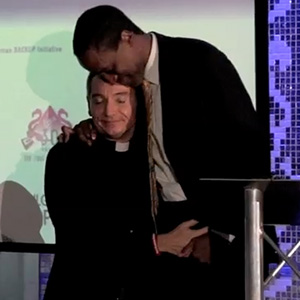


Born into a homophobic society, what are you willing to sacrifice to survive?
THE ABOMINABLE CRIME, at heart, is a story about a mother's love for her child and an activist's troubled love for his country. It also gives voice to gay Jamaicans who, in the face of endemic anti-gay violence, are forced to flee their homeland.
Simone, a young lesbian single mother, survives a brutal anti-gay shooting. Now she must choose between hiding with her daughter in Jamaica in constant fear for their lives or escaping alone to seek safety and asylum abroad.
Maurice, Jamaica's leading human-rights activist, is outed shortly after filing a lawsuit challenging his country’s anti-sodomy law. After receiving a flood of death threats, he escapes to Canada, and then risks everything to return to continue his activism.
Told first hand as they unfold, these personal accounts take the audience on an emotionally gripping journey traversing four years and five countries. Their stories expose the roots of homophobia in Jamaican society, reveal the deep psychological and social impacts of discrimination on the lives of gays and lesbians, and offer an intimate first-person perspective on the risks and challenges of seeking asylum abroad.
Homophobia is a human rights problem, and the struggle for equal treatment of LBGT people is a global human rights issue.
In Jamaica being gay is a crime, homophobia is the status quo, and violence against the LGBT community is widely approved and accepted. HIV now infects nearly a third of the gay male community, who must live in the shadows or risk their lives.
Since filming began in 2009, five characters in THE ABOMINABLE CRIME have fled Jamaica after dealing with gunfire, mob violence, and death threats.
Today, people like Simone and Maurice must choose between their lives and their homeland -- exile or death.
These stories are well worth telling because the impacts of Jamaican homophobia stretch far beyond the Caribbean, as refugees like Simone and Maurice seek asylum and safety in the US, Canada, and Europe.
THE ABOMINABLE CRIME is not just a film about homophobia and violence, it also demonstrates in a deeply personal and intimate manner how courage and love can transcend violence and fear.
This film was born when Jon Sawyer and Nathalie Applewhite of the Pulitzer Center on Crisis Reporting originally commissioned me to report on HIV/AIDS in the Caribbean.
After a while, we decided to focus on Jamaica – where Pulitzer had done the award winning project “Live, Hope, Love.” Once we had a country focus and some story ideas, they did the hard work of pitching the ideas to PBS World Focus, which agree to support and run the series. As part of this project, they also pitched a feature story I wrote to the Atlantic, called “How AIDS Became A Caribbean Crisis.”
During the reporting for this series, which we called “The Glass Closet,” I met Simone Edwards and began filming with her and her daughter Khayla.
I remember sitting on Jon’s porch after returning from Jamaica on one of my reporting trips and telling him about Simone’s story – and he agreed to support me as I continued following Simone’s story. It was a amazing story of survival and courage that had never been told before – and I think he was excited as I was!
Over the years that followed (I had promised Simone that we wouldn’t air anything until her daughter was safely reunited with her), Jon’s patience was extraordinary. Of course, he did ask every once and a while when I thought the film would be done, but he also understood that there were unique aspects to telling this difficult story – and telling it fully – and he was willing to wait.
And two years later, when we began filming Maurice’s story, he got it. He understood how Maurice’s story framed and explained the background to Simone’s story, and his support continued. Stories like these don’t always work out – but he continued to believe in this project.
It took more than four years.
The Pulitzer Center’s willingness to support a long-term journalistic enterprise with no clear ending point is just one part of their remarkable contribution to the contemporary journalistic landscape. As mainstream broadcasters cut back on foreign reporting, and as reporting bureaus and budgets around the world shrink, the Pulitzer Center is forging ahead with a new vision of how serious international reporting can be funded and disseminated across a variety of media. The goal is not stylistic, but journalistic – getting the word out about critical international stories that shape our world.
Without the Pulitzer Center on Crisis Reporting’s support and patience, lasting more than four years, this film – and Simone and Maurice’s story -- would never have been told!
I am deeply grateful for their support, encouragement, and investment in this project.
To see more of the reporting the Pulitzer Center has done on HIV in the Caribbean, please visit: http://pulitzercenter.org/hivaids-caribbean.
Producer/director Micah Fink





